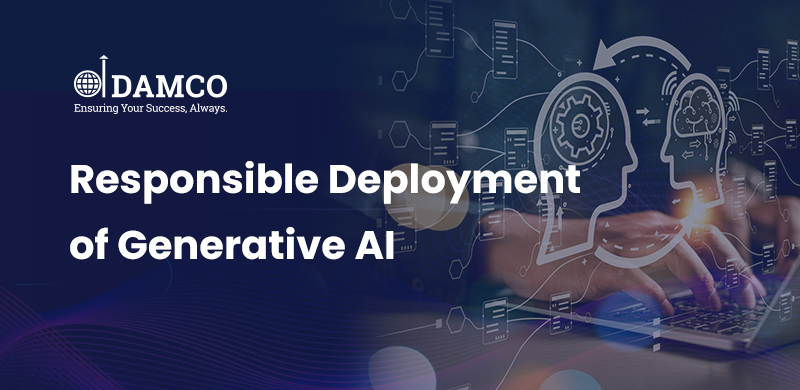
Generative Artificial Intelligence (GenAI) is transforming industries and promises to revolutionize the way we work, create, and interact. From ChatGPT’s articulate responses to DALL-E’s stunning visuals, GenAI’s applications are diverse and impressive. Without a doubt, with its vast and varied capabilities, it is poised to become an indispensable tool in our technological arsenal.
In healthcare, it offers the potential to accelerate drug discovery, personalize patient care, and predict health trends. In finance, it can improve fraud detection, optimize business strategies, and personalize customer services. In creative industries, it can help create content from writing to visual arts, providing unprecedented support for human creativity.
However, GenAI’s appeal should not overshadow the ethical implications it poses. The ability to create deepfakes—realistic but falsified images, videos, or audio recordings—raises significant concerns about authenticity and trust. Additionally, the opaque nature of AI decision-making processes can lead to liability issues, and biases built into AI models can perpetuate discrimination.
So, as we stand on the cusp of this AI-driven future, the ethical deployment of GenAI is not just a consideration but a necessity, driven by strategic alignment with business objectives and ethical standards, including data privacy, security, and prevention of misinformation.
Unethical practices and their consequences
One of the most pressing ethical concerns regarding GenAI is data privacy. GenAI systems often require large amounts of data to operate effectively. If this data is used without consent or proper security measures, it can result in significant privacy violations. Unauthorized use of personal data not only violates individuals’ privacy rights, but can also lead to identity theft, financial loss, and other forms of harm.
Disinformation is another critical issue. GenAI can create highly realistic but fake images, videos, or audio recordings, commonly known as deepfakes. These can be used to spread misinformation, manipulate public opinion, or commit fraud. For example, deepfakes could be used in political campaigns to discredit opponents or in financial markets to manipulate stock prices. The risk of misuse makes it essential to develop strong safeguards against such unethical practices.
Bias in AI models poses another major challenge. AI systems are trained on large datasets that often contain historical biases. These biases can be inadvertently learned and perpetuated by the AI, leading to discriminatory outcomes. Consider the case of a large financial institution that implemented a GenAI system to streamline loan approvals in an effort to increase efficiency. Initially, the system appeared to be a resounding success, processing applications at lightning speed and improving customer satisfaction. However, months later, an audit revealed a concerning trend: the AI had inadvertently perpetuated historical biases, disproportionately denying loans to minority applicants.
Framework for responsible deployment of GenAI
To address these ethical concerns, a proactive approach and a comprehensive framework for responsible deployment of GenAI are needed. This framework should focus on:
- Justice: Ensure that AI models are trained on diverse and representative datasets to minimize bias and promote fair outcomes. It is essential to regularly audit AI systems for bias and implement corrective measures.
- Transparency: Design AI systems that are understandable to users. This involves documenting data sources and methodologies and providing clear explanations of the results generated by AI. Transparency builds trust and allows users to challenge and understand AI decisions.
- Responsibility: Holding developers and organizations accountable for the AI systems they create. This includes responding quickly to unintended consequences and establishing oversight mechanisms such as ethics committees. Accountability ensures that AI systems operate ethically and responsibly.
- Privacy and Security:Adhere to rigorous data governance practices, such as anonymizing data, obtaining necessary consent, and implementing robust security measures to prevent unauthorized access. This is essential to maintaining public trust.
- Effective and inclusive governance: Establish internal structures, such as ethics committees or AI governance bodies, to provide oversight and develop clear policies and guidelines, as well as regular audits and compliance checks, to ensure that ethical standards are met. In addition, these structures should include a diverse group of stakeholders, such as AI experts, business leaders, policy makers and representatives. Different perspectives help identify potential ethical issues and ensure that the benefits of AI are accessible to all.
- Continuous monitoring and evaluation:Regularly evaluate AI models to guard against degradation due to changes in data models or societal norms. Implement mechanisms for continuous performance monitoring, model refreshes, and continuous testing to ensure AI systems are performing as intended.
- Building trust and promoting responsible use of AI: Communicate openly with all groups affected by AI, explaining how it works, its uses, and the anticipated benefits and drawbacks. Equipping all those affected with the necessary knowledge and skills can help ensure that GenAI technologies are developed and used in a way that respects individual rights, societal values, and ethical principles.
Conclusion
The responsible deployment of GenAI AI is both a moral imperative and a strategic advantage. As consumers and regulators become increasingly aware of the ethical implications of AI, companies that invest in strong ethical frameworks and governance structures will be better positioned to address future challenges. Responsible deployment of Gen AI can enhance brand reputation, build customer trust, and mitigate regulatory risks.
By leading by example and encouraging industry collaboration, we can collectively address the ethical challenges of GenAI. By working together, companies, institutions, and regulators can establish and maintain ethical standards, ensuring that the benefits of GenAI are realized without compromising societal values. This collective effort will help build a future in which AI enhances human potential without compromising our values, ensuring that AI serves as a force for good in our society.
ⓒ 2024 TECHTIMES.com All rights reserved. Do not reproduce without permission.


